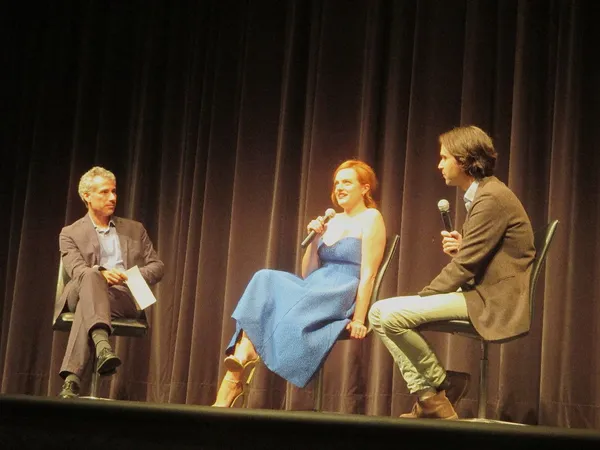 |
| Queen Of Earth's Elisabeth Moss and director Alex Ross Perry at MoMA with Josh Siegel Photo: Anne-Katrin Titze |
The disquieting power of laughter, shooting a film in sequence, countering movie clichés about female friendship, a Doris Day Pillow Talk moment, hysteria, editing time (by Robert Greene and Peter Levin), Edvard Munch, Musidora in Louis Feuillade's Les Vampires, slow zooms (cinematography by Sean Price Williams), plus Alfred Hitchcock and Roman Polanski's use of food, entered into Josh Siegel's conversation with Queen Of Earth director Alex Ross Perry and star Elisabeth Moss.
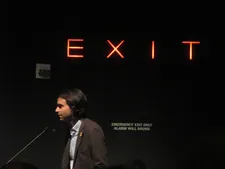 |
| Alex Ross Perry introducing Queen Of Earth Photo: Anne-Katrin Titze |
Catherine (Moss) visits her old friend Virginia (Katherine Waterston) at her family's lake house to recover and possibly come to terms with two recent traumatic events in her life. Her father, a famous artist whose estate Catherine manages, committed suicide, and her longtime boyfriend James (Kentucker Audley) left her. "Thanks for the exile," she tells Virginia at the start of the week in the woods. Two different time structures exist. The days of the week on screen, starting with Saturday, ending on Friday. Flashbacks to the previous year's very different visit show a much cheerier Catherine, sporting almost clownish makeup, and shifting dynamics of anger that include James and Rich (Patrick Fugit), Virginia's neighbor.
In the present time of grief and anger, Catherine has mysterious face pains, reminiscent of Helma Sanders-Brahms' Germany Pale Mother, where Eva Mattes' character suffers after the world war outside was over and the war had "moved inside the houses." Alex Ross Perry has made a movie about a very present-day war inside.
At The Museum of Modern Art special screening inside a packed Titus Theater One, Josh Siegel, Curator in the Department of Film, started from the back forwards.
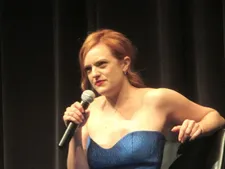 |
| Elisabeth Moss: "I like that it's a film about two women who are friends but there are no pillow fights or slumber parties." Photo: Anne-Katrin Titze |
Josh Siegel: The two outbursts of laughter are to me almost shocking. The obvious one is the last one. The shock to me is that you [Elisabeth] look so effervescent. You look so different than you looked until this point, sort of relaxed… I wondered if those two bouts of laughter were always in the film at the end? Were they written as the kind of crescendo of the film?
Alex Ross Perry: That's a very intelligent question and very serious. I am sure that the little chuckle in the final flashback is just part of the scene being played.
Elisabeth Moss: That was just me laughing at Katherine [Waterston]. I think that it was a very casual laugh. It wasn't intentional.
ARP: In the end the final shot, the whole thing was like… We shot the movie in order. So that was like the last thing we were doing the last day we were filming there. It was just finding a kind of enigmatic end of the movie that gives it this sort of objective quality.
JS: It does come as a shock because there's not a lot of laughs until this point.
EM: It was our last day and we'd shot everything pretty much and we didn't know what the ending was going to be exactly. And he was just like, go down onto the dock and sit there and then just laugh. Sort of nicely. That's kind of our working relationship. There's a lot of trust, obviously. I didn't know that that was going to be the end of the movie.
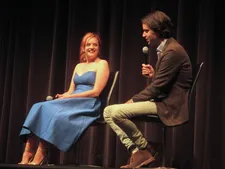 |
| Elisabeth Moss and Alex Ross Perry: "Things are really horrible now, how did we get here?" Photo: Anne-Katrin Titze |
JS: How did you describe your character in discussing it in relation to Virginia?
EM: I relate it to a friendship where you probably were friends since you were 11 or 12. Your families are friends, your parents are friends, you went to camp together. Over 20 years you probably grow apart a little bit but you still stuck with each other. A little bit too late to not be friends. I think a lot of people have these friendships. It's very real and I like that it's a film about two women who are friends but there are no pillow fights or slumber parties.
Alex Ross Perry interjects at this point, drawing laughter.
JS responds: it was originally a Doris Day movie… There's the Vampyr aspect of their relationship too. The final drawing of Virginia is like the Munch portrait of the Madonna. We're at MoMA, we're allowed to make allusions to Edvard Munch! There's a great drawing of a Madonna that he did with a red halo around her head. And then of course that costume that Virginia runs in that is right out of Musidora in Les Vampires. There is something vampiric about their relationship. Maybe actually in general about all the relationships in the films that you make.
ARP: Maybe. What's interesting about the dichotomy between two people, obviously in writing the most simple version of it, people are just different sides of the same argument. That's where the basis is for the drama… That's my favourite question: Things are really horrible now, how did we get here?
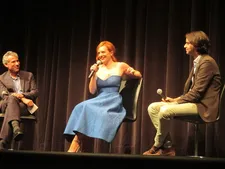 |
| Elisabeth Moss with Josh Siegel and Alex Ross Perry: "And he was just like, go down onto the dock and sit there and then just laugh." Photo: Anne-Katrin Titze |
JS: One critic recently described your character that it was "unashamedly histrionic and hormonal". I guess we shouldn't be surprised in 2015 - I mean, presidential candidates use this language too. I guess, the question is partly why it is such a timeless trope, the hysterical woman, that is so appealing to people, that it continues to this day to be the main subject of a film. I can't think of many instances where you see hysterical men. Even serial killers are calm and collected.
EM: I think you have a point. There's an emotional level that women and actresses seem to go to probably more than men. It's often up to the writers, it's not the actors or actresses. I think this is a very specific portrayal of a woman going insane and allowing herself to indulge in feelings that we all feel as normal people, but allowing herself to completely dive in and not hold back. Which is kind of nice as an actress as well. Yes, she totally is crazy and histrionic but I think she is also insane. By the end of the movie she has really gone to a very dark place. I don't think she's hormonal.
JS: Talk a little bit, Alex, about the editing. I am wondering how you built up these scenes. Did you do a lot of takes or was it really well composed before you started shooting?
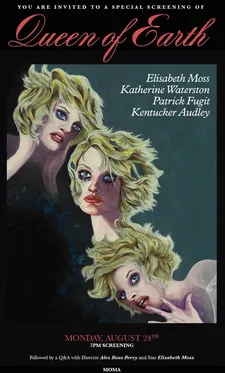 |
| Queen Of Earth Special Screening at MoMA invitation |
ARP: I lose interest pretty quickly. Once I see something I like and I see something I like again, I seem to like it less because it seems less perfect. A movie like this, which is largely slow zooms and cutting pieces together, there is not a hundred versions of every scene. So the editing is an exercise in restrained elegance in knowing when to cut because you don't really have to. It's just like a balancing act. In the last movie, every scene had five versions. If you edit it like this, it plays for laughs, if you edit it like this, then there's basically nothing funny about it.
It was a long complicated editing process. But this movie, most of the scenes as they are right now were pretty much what they were in the first edit… Not every movie that comes out even demands questions about the craft of it, the cinematography or the editing. I think there is no reason for that. I think if you are careful and employ good people who do great work, you have to have serious conversations about syntax. In middle-brow independent cinema you never talk about the editing.
Anne-Katrin Titze: Food is obviously important in the film - what people eat, what they don't eat, how they eat. How did you come up with the movie's menu?
ARP: That's a great question. I'll never get asked that one again. You know, a lot of food is really disgusting when you look at it. And if you leave it out for two weeks, like that salad, it's like really disgusting. In Polanski and also Hitchcock there's a lot of food being used in a disgusting way, that identifies the thing as unsavoury. It just uses something that is thought of as being wholesome and comforting as a sign of what's gross and unpleasant.
Yeah, I mean, this final confrontation between your character [to Moss] and Patrick [Fugit as Rich] takes place over that dinner. After shooting the movie and watching cuts of it, the DP was like, "What's he eating for dinner?" Edamame and crackers! And pieces of tomato with his fingers, which is another revolting behaviour. Again, shooting in order, we'd made this nice salad that Katherine gives to Elisabeth. By the end, that salad, nobody could touch it because it was a prop. There's flies buzzing around it, it was really disgusting. If it worked that way, great. I love food, personally.
Queen Of Earth opens in the US on August 26.





















